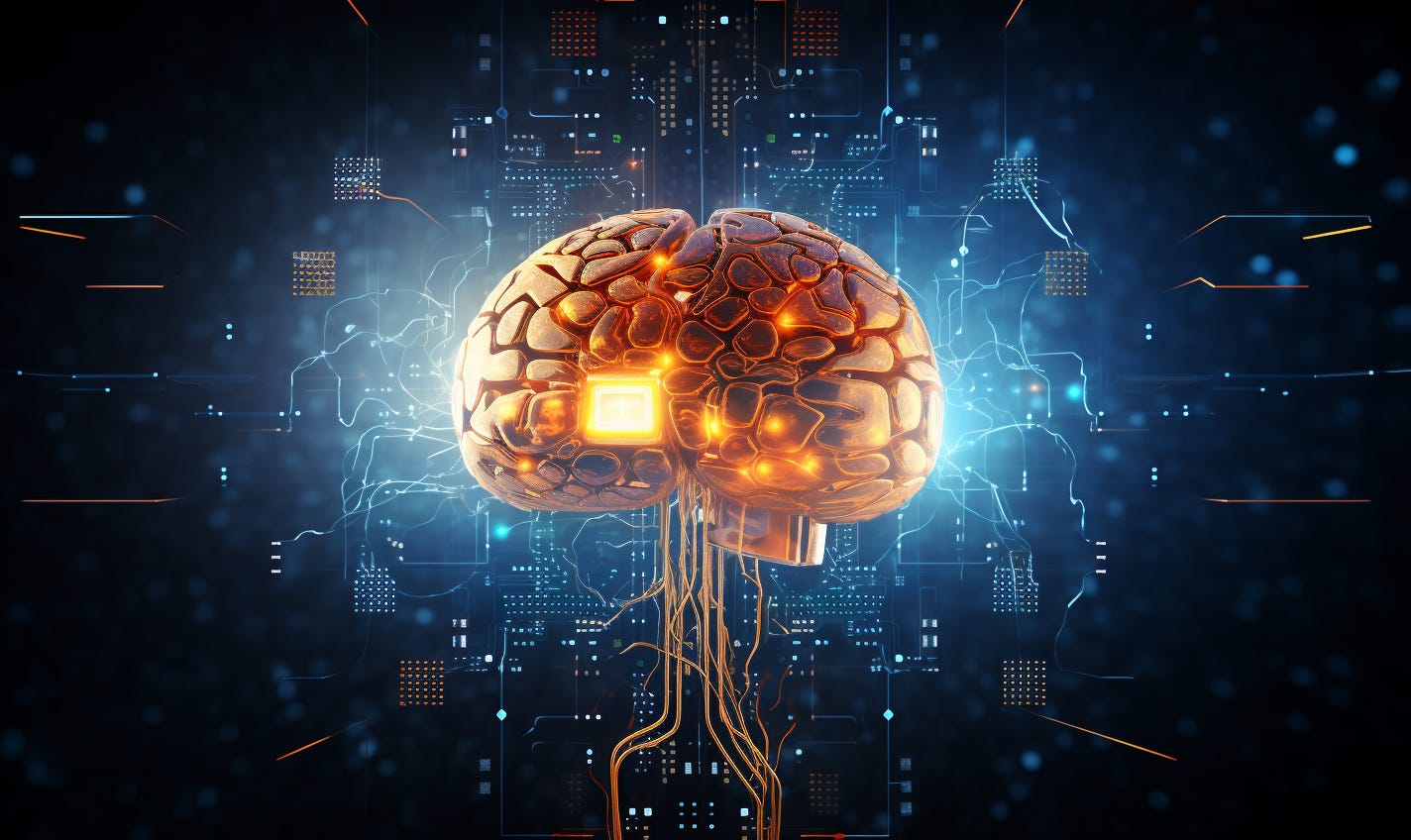The Augmented Age: AI as an Extension of Human Capabilities
AI augmentation could transform problem-solving if built on human values, but it's up to us to ensure these tools augment rather than replace human wisdom as we harness their potential for good.
Humanity has long-harboured a timeless aspiration for ages: the creation of intelligent machines capable of human-like thinking, reasoning, and learning. In a momentous turn of events, artificial intelligence (AI) has triumphantly emerged after years of speculation and progress. The remarkable advancements in AI technologies offer unprecedented opportunities to enhance human decision-making and unlock new realms of human potential. It is an extraordinary moment that holds immense promise for the future of our species.
AI Augmentation and Change
As artificial intelligence (AI) technologies continue to advance exponentially, the potential of AI augmentation to enhance human decision-making and capabilities has become increasingly apparent. AI systems now far surpass the human brain's capacity to analyze vast amounts of information and provide tailored recommendations or judgments.
This augmentation ability holds great potential to impact various domains that involve complex choices and trade-offs, including activism, social change, and the fight against extremism. By surfacing relevant information, analyzing complex scenarios, and offering personalized insights, AI augmentation can support and optimize human planning, decision-making, and goal-setting, amplifying social progress initiatives' impact.
Used responsibly, AI augmentation represents a significant leap forward for humanity, with the potential to optimize processes and augment human wisdom in addressing global challenges that rely on nuanced and multifactorial judgments. However, realizing this promise will require placing ethical considerations and humanist values at the forefront of AI development and integration from the outset.
AI Ethical Considerations
While the potential of AI augmentation to enhance human performance and decision-making is significant, realizing this promise in a sustainable and beneficial outcome requires responsible development that prioritizes ethics and humanist values. As AI systems grow in complexity and autonomy, moving beyond purely analytical calculation to incorporate judgment and recommendations, the need for safeguards to ensure outcomes aligned with human ideals becomes increasingly imperative. Without proper oversight and governance, AI augmentation risks exacerbating societal problems or enabling outcomes that fail to consider principles of ethics, dignity and human well-being.
For AI to truly augment human capabilities and enable progress in social domains, it must be developed with an acknowledgement of human limitations and a commitment to expanding human priorities of wisdom, compassion, and morality. This approach prevents AI systems from shaping human judgments and goals in ways that detach us from our highest humanist values. Therefore, as we leverage the power of AI, it is essential to integrate ethics and social responsibility directly into the design and governance structures of AI augmentation technologies. By incorporating humanist principles of dignity, inclusivity, fairness, and autonomy into their architecture from the outset, AI-integrated systems can be developed to complement humanist values and foster the positive evolution of society.
Responsible AI Development
The exponential growth and increasing capabilities of AI technologies are ushering in a transformative era that will reshape every aspect of human life and society. AI-integrated applications rapidly expand into more complex domains that require judgment, interpretation and the ability to provide tailored recommendations.
As artificial intelligence continues to be integrated into our systems and processes, its application in augmenting human decision-making reveals a potential for significant influence on crucial matters such as activism, human rights, democracy, social progress, and human well-being. This advancement underscores the growing necessity for responsible development and comprehensive governance of AI technologies.
In a rush to implement these technologies and capitalize on their benefits, it is easy to lose sight of the need for safeguards, oversight and governance structures that ensure alignment with humanist principles. Such measures are necessary for the rapid proliferation of AI to avoid enabling ethically questionable or detrimental outcomes at scale.
As AI augmentation technologies continue their exponential growth and gain the ability to shape human progress fundamentally, it is imperative that we rise to the challenges of responsible development and governance, prioritizing the values of transparency, accountability, fairness and empowerment. The implications of getting this right - or wrong - for the trajectory of human progress and societal impact are immense. Therefore, proactively addressing ethics, data quality, explainability and human impact must become an integral part of the evolution of AI augmentation from the very beginning.
In this essay, I will explore the potential of AI augmentation in socially impactful domains and discuss the ethical considerations that are crucial for responsible development and use. Following this introduction, I will delve into the benefits of AI augmentation in education, healthcare, and the workplace. I will also examine how AI-augmented judgment can revolutionize decision-making in areas such as human rights, democracy, political activism, social change movements, and efforts against religious extremism, all while promoting humanist values.
Additionally, I will highlight real-world applications where responsible AI use is already making a positive impact. I will analyze the principles that are essential for responsible development, regulation, and governance of these evolving technologies. Throughout the essay, I will emphasize the immense promise and inherent risks associated with AI, emphasizing the critical role of human wisdom, values, and oversight in ethically harnessing AI for progress.
My goal is to provide essential tools for navigating this new world to a diverse range of individuals, including human and civil rights activists, grassroots organizers, community leaders, social justice advocates, local governance officials, social entrepreneurs, scholars, political science students, educators, trainers, policymakers, civil service workers, and politicians. By examining the potential and pitfalls of this technological epoch from a humanist perspective, I aim to offer a roadmap for developing AI augmentation that aligns with our shared humanist goals and values.
AI: A Fork in the Road
The following 20-minute documentary provides an illuminating perspective on the transformative potential - and risks - of AI technologies. While AI expands human capabilities in profound ways and offers revolutionary benefits if harnessed responsibly, it also poses challenges for human wisdom, agency and autonomy.
Wakeup Calls from the AI Age
- AI is a transformative force that expands beyond the capacity of the human brain, impacting every dimension of the world today.
- AI has the potential to either turn us into super-humans or lead us into a very dark place, depending on how it is controlled and used.
- AI has the ability to scale the impact of great minds by providing every individual with a teacher or teaching assistant, enabling them to operate at a higher level of intelligence and knowledge.
- By 2030, AI combined with human services in hospitals can significantly reduce medical errors and improve accuracy in diagnosing diseases, making it essential for healthcare professionals to incorporate AI into their practices.
- AI will fundamentally shift the way we use time, ideally allowing us to thrive, be excited, experience more joy, and self-actualize.
- AI systems are becoming so good at language and logic that we start to trust and seek advice from them, even in personal relationships, raising concerns about the loss of human reasoning and reliance on AI.
- AI has the potential to be largely positive if we architect values into technology and create a software "Constitution" that promotes curiosity, wisdom, and compassion.
- The positive forks in AI development require the involvement of academia, ethicists, and human creativity to ensure responsible and beneficial use of the technology.
The Power and Potential of AI
AI Ubiquity and Capability
Artificial intelligence (AI) technologies have surpassed human brain capacity in myriad ways, driven by the exponential increases in computing power and vast troves of data available for Large Language Models (LLMs) and other machine learning algorithms. The capabilities of AI systems today stretch beyond what a solitary human brain could ever achieve, with machines now able to recognize patterns, form complex associations and generate predictive judgments at speeds and scales that exceed human limitations.
As a result, applications of AI are becoming ubiquitous in daily life, powering everything from product recommendations and language translations to autonomous vehicles and medical diagnostics. AI has essentially become a pervasive instrumental force now permeating industries, institutions and human activities at unprecedented rates. From finance and business to transportation, retail, media and more, applications of AI and automation continue to rapidly infiltrate nearly every crevice of modern existence.
These shifts underscore how AI technologies have not only expanded beyond the range of human brainpower but are redefining the very contours of what constitutes daily life by fundamentally reshaping many of the systems and processes that humanity has come to rely on. With AI projected to augment, match or even surpass human capabilities in the next decade across many domains, it is quickly becoming a transformative force of exponential progress with the potential to either largely benefit or detrimentally disrupt humanity - depending on how we responsibly channel this power.
What is an LLM?
An LLM, or Large Language Model, is a remarkable achievement in computer science and artificial intelligence. Its advanced technology and extraordinary command of language can comprehend and replicate human communication with a striking resemblance to our own cognitive abilities. Unlike mere mimicry, the LLM harnesses the collective body of human knowledge meticulously stored within a vast digital repository containing a wealth of texts, such as books, articles, and websites. With its extraordinary capabilities, the LLM surpasses human performance by generating responses indistinguishable from what a human would. It effortlessly constructs coherent sentences, paragraphs, and even entire essays, seamlessly weaving together information from this extensive wellspring of wisdom.
Behind the scenes, brilliant minds in computer science and various domains poured their expertise into creating the LLM. They supplied it with an immense wealth of information, satisfying its insatiable curiosity, much like an avid reader voraciously consuming books, articles, and websites. As a result, the LLM assimilated this extensive wealth of knowledge, transforming into a boundless source of information, skillfully weaving words and phrases with uncanny finesse.
Within its virtual existence, AI encapsulates the essence of a scribe, an erudite scholar, and a Shakespearean wordsmith, all harmoniously united in a single entity. It also encapsulates the essence of intelligence confined within a box, an ever-present companion poised to enhance your capabilities and amplify your potential. AI becomes an intellectual companion, perpetually at your side, standing at the ready, an unwavering ally that remains within reach whenever you require its assistance. Its tireless work ethic and ability to learn and adapt ensure it continuously improves and evolves to serve your needs better.
Together, let's embark on a journey to explore the captivating abilities of the LLM and unlock the enchanting magic that reveals the boundless potential of AI augmentation. Through my work, showcased in this essay and blog, I harness the remarkable power of the LLM to navigate vast realms of knowledge, diving into diverse ideas, connecting seemingly unrelated concepts, and presenting information through unique perspectives and compelling narratives. These endeavours push the boundaries of what was once considered beyond human grasp, illuminating fresh perspectives and offering valuable insights.
AI Enhancement in Society
Beyond merely surpassing human brainpower in capabilities, AI technologies also hold tremendous potential to enhance human potential and fundamentally improve various aspects of society. Rather than replacing humans, AI is poised to augment human capacities in ways that can radically improve critical areas such as healthcare outcomes, learning experiences and job satisfaction.
In the healthcare sector, AI systems are already assisting physicians in reducing medical errors and improving diagnostic accuracy. By augmenting the knowledge and insights of medical professionals, AI enables data-driven decisions that can save lives and enhance patient care. Similarly, AI has the power to revolutionize education by personalizing learning experiences and adapting instruction to cater to individual student needs, removing barriers to effective learning and maximizing each child's potential. Numerous studies indicate that AI-assisted tools significantly improve learning outcomes by allowing teachers to focus more on empathy and problem-solving skills.
Within the workplace, AI has the potential to augment human workers, boosting productivity, efficiency, and overall job satisfaction. From reducing time spent on administrative tasks to assisting with complex decision-making and creative problem-solving, AI tools promise to optimize work processes and free up time for more enjoyable and meaningful work. Surveys indicate that a majority of workers view AI as a means of augmentation rather than replacement, with many excited about the prospect of AI enhancing their productivity and creativity in their roles.
These examples illustrate how, rather than posing an existential threat to human livelihoods, AI is a tool to augment human capabilities in targeted ways that fundamentally improve key aspects of society. By assisting and enhancing human decision-making, AI technologies have the potential to optimize processes, unlock untapped human potential and make meaningful contributions to social progress that benefit all of humanity.
AI as Augmentation, not Replacement
For AI technologies to truly realize their potential for enhancing human capabilities and improving society, it is imperative that they be viewed first and foremost as augmentation tools to assist and enhance human abilities rather than replacements for human professionals in various fields.
Conversely, by considering AI as a complementary tool that assists and enhances human abilities, we ensure its development aligns with our interests, needs, and values. When organizations implement AI systems with the aim of augmenting human workers rather than substituting them, the outcomes tend to be more positive in terms of job satisfaction, productivity gains, and overall societal benefits. This perspective acknowledges AI as an assistive technology that works in harmony with human professionals, making meaningful contributions that align with human values and priorities.
On the other hand, perceiving AI as a replacement for human roles risks detaching it from human principles of ethics, dignity and fair distribution of benefits. Without proper safeguards in place to ensure that AI augmentation actually serves societal needs, there is a risk that it may be developed primarily to optimize efficiency and generate profits at the expense of human interests. To mitigate this risk, the more that human priorities, values and expertise inform the development of AI technologies, the greater the likelihood they will augment - rather than threaten - vital human capabilities and contributions.
Thus, framing AI systems first and foremost as tools to augment - rather than substitute for - human professionals represents a more sustainable paradigm for development that prioritizes the optimization of combined human-AI capabilities rather than the automation of human roles. Adopting this framing ensures that even as AI capabilities expand, they do so in a way that enhances - rather than replaces - the contributions, decision-making and expertise of human professionals for the ultimate betterment of society as a whole.
Sector-Specific AI Innovations
Artificial Intelligence (AI) is revolutionizing various domains, reshaping our lives and work by unlocking new possibilities and transforming traditional practices. Its impact spans across multiple sectors, including education and healthcare, where it offers personalized experiences, improved efficiency, and enhanced outcomes.
Education- Personalized Learning for Student Success
AI technologies have the potential to significantly enhance learning experiences and empower students to reach their full potential in the field of education. By leveraging AI-assisted tools, instruction can be tailored to meet each student's unique interests, strengths, and needs, moving beyond the limitations of traditional one-size-fits-all approaches.
For instance, AI tutoring systems can analyze a student's struggles with complex concepts and draw from a vast knowledge base to provide customized, step-by-step support that precisely addresses their difficulties. This personalized assistance allows students to progress at their own pace while eliminating the embarrassment often associated with learning challenges.
Research has shown that AI tutoring systems offering individualized help and feedback can yield remarkable improvements in student outcomes, particularly for those from disadvantaged backgrounds (International Journal of Educational Technology in Higher Education, APA Journals). As AI capabilities continue to expand, the vision of AI-enhanced collaborative learning environments emerges, optimizing education by tapping into each student's unique talents and interests, unlocking their full potential. AI becomes an invaluable tool that transforms education from passive information delivery to an active optimization of learning experiences, fostering individual development and growth from an early age.
Workplace - Boosting Efficiency and Job Satisfaction
Within the workplace, AI technologies offer immense potential to enhance productivity, efficiency, and job satisfaction. By automating mundane and repetitive tasks, AI tools liberate workers' time, allowing them to focus on more engaging and fulfilling aspects of their jobs. Studies have shown that AI assistants handling administrative duties such as scheduling, data entry, and report generation can increase worker productivity by 14-30% while reducing stress levels (Harvard Business Review, CNBC).
In addition, AI tools serve as augmentations, providing workers with timely information, expert recommendations, and personalized insights. AI agents offering tailored suggestions and insights related to specific projects or tasks have been proven to improve performance and task completion rates significantly. Moreover, AI systems that detect errors and anomalies in output contribute to cost reduction by minimizing mistakes.
Beyond efficiency, AI has the power to enhance job satisfaction and foster creativity. By relieving employees of routine tasks, AI enables them to dedicate more time to challenging assignments that leverage their unique skills and interests. Surveys and research studies have indicated that AI-supported employees report higher fulfillment, motivation, and a greater sense of autonomy in their work (Deloitte Insights, Harvard Business Review, Dinasti International Journal of Digital Business Management, VentureBeat, Forbes). These findings highlight the positive impact of AI in the workplace, empowering employees to focus on meaningful and value-added activities, leading to increased job satisfaction and creativity.
Looking ahead, AI is poised to become a collaborative partner, assisting humans in tackling complex challenges that require both machine intelligence and human ingenuity. While AI handles data processing, analysis, and insights, workers can focus on strategy, interpretation, and creative problem-solving. This harmonious fusion of human and machine strengths optimizes outcomes, transforming the future workplace into an environment where AI acts as an augmentation technology, enhancing productivity, job satisfaction, and overall human potential in meaningful ways.
Healthcare - Advancing Accuracy, Access, and Caregiver Support
In healthcare, AI technologies have tremendous potential to improve diagnostic accuracy, expand access to care, and assist overburdened medical professionals. AI systems that can analyze complex patient data and medical images are already demonstrating more accurate diagnostic capabilities than doctors for certain conditions. AI tools that identify subtle signs, patterns and anomalies can help catch diseases early - when they are most treatable - and reduce misdiagnoses.
AI is also expanding access to quality healthcare, especially in underserved communities. AI-powered virtual health assistants and remote patient monitoring devices are enabling people in remote areas to access basic care and manage chronic conditions with the aid of AI. And AI algorithms that recommend the most effective treatments based on a patient's specific health profile promise to optimize prescription drug usage and cut costs from costly - and sometimes dangerous - trials of multiple medications.
Perhaps most significantly, AI tools show considerable potential to augment overburdened healthcare workers by assisting with administrative tasks, flagging critical test results, and providing just-in-time information and treatment recommendations. This AI-driven optimization of workflows and decision-making has the potential to not only improve patient outcomes but also reduce physician burnout by freeing up time for more meaningful work.
As AI and machine learning capabilities continue to advance, the opportunities for AI to improve accuracy, expand access, and assist caregivers will only grow. However, realizing this potential will require confronting issues of data and algorithmic bias head-on to ensure AI augmentation benefits all patients equitably and enhances - rather than replaces - the critical role of skilled medical professionals.
Mental Health - Democratizing Knowledge, Support and Guidance
In the realm of mental health and well-being, AI technologies show promise for democratizing knowledge, providing around-the-clock support, and enhancing individuals' well-being through objective guidance and tailored recommendations. AI systems that can analyze a person's speech, text communications and digital activities are already demonstrating the ability to detect early signs of depression, anxiety and other issues with a level of objectivity that human therapists may miss.
AI mental health applications have the potential to serve as always-on digital coaches and mentors that provide timely guidance, challenge negative self-talk and suggest strategies based on cognitive behavioural therapy principles. By analyzing an individual's specific symptoms, challenges and personality traits, AI tools show promise for generating personalized recommendations and treatment plans tailored exactly to one's needs. This just-in-time support has the potential to improve mental health outcomes at scale by intervening early and guiding individuals through developing better-coping mechanisms and habits.
However, for AI to truly enhance human well-being in a responsible manner will require care and diligence, as mental health presents some of the most complex and sensitive challenges for AI. Issues of privacy, potential biases in data and algorithms, and the inability of AI to fully replace the empathic human connection that traditional therapy provides must all be addressed head-on.
Still, as an augmentation technology that can democratize knowledge, provide consistent support, and generate optimized yet personalized recommendations, AI does hold considerable potential to enhance mental well-being - if developed with ethical considerations, explainability, and respect for the complexity of the human condition at the forefront. Used responsibly as an assistive tool rather than a replacement for human care, AI could help improve mental health outcomes for many who otherwise lack access to consistent support systems.
The Impact of AI-Augmented Judgement
Complex Analysis & Surface Tailored Recommendations
One of the most promising applications of AI augmentation lies in its potential to optimize complex decision-making processes that require analyzing multifaceted scenarios, surfacing relevant information and tailoring nuanced recommendations. As AI capabilities continue to expand in areas like natural language processing, machine learning and automation, the prospect of AI-augmented judgment to aid important choices and trade-offs grows increasingly possible.
AI systems have already demonstrated the ability to analyze vast troves of data, identify complex patterns and issue probabilistic predictions with a speed, scale and accuracy that exceeds human limitations. When deployed to aid decision-making around mission-critical issues that impact society - from human rights dilemmas to public health initiatives - these capabilities hold enormous potential for positively transforming outcomes. By bringing to light relevant factors, historical case studies, and optimized strategies that human decision-makers may overlook, AI augmentation has the power to revolutionize judgment on multifaceted challenges that determine human flourishing and social progress.
In domains like human rights activism, democracy promotion, social change movements and efforts to counter religious extremism, decisions hinge on synthesizing a myriad of considerations, including political, economic, cultural and moral dimensions. The capacity of AI systems to analyze massive datasets, identify subtle patterns and issues, and generate optimized yet nuanced recommendations based on specific contexts opens up opportunities to inform and augment human decision-making around these weighty issues in ways that facilitate more positive outcomes and wider societal impact.
Revolutionizing Decision Making
By analyzing complex scenarios, surfacing relevant information and tailoring precise recommendations, AI augmentation holds tremendous potential to revolutionize decision-making processes regarding some of society's most complex and consequential issues. In domains like human rights activism, social change movements, democracy promotion and countering extremist ideology, AI-augmented judgment could significantly scale impact by:
Optimizing strategies and resource allocation: By analyzing massive datasets on historical social movements, AI systems may be able to recommend optimized resource allocation, engagement strategies, and press/PR tactics tailored to a specific issue context that human organizers may miss.
Targeting interventions where most effective: By identifying sociodemographic patterns in populations vulnerable to extremist radicalization or sociopolitical marginalization, AI tools may suggest targeted interventions and initiatives that optimize impact.
Coordinating distributed Networks: By processing data from distributed activist networks, organizing collaborations, and monitoring news/social media, AI systems may help optimize the coordination of dispersed social change actors working toward a common goal.
Detecting emerging issues and opportunities: By continuously monitoring news, social media and various data sources, AI systems could detect emerging issues, opportunities and potential threats to social progress at an earlier stage to inform strategic planning and resource allocation.
Through capabilities like these, AI augmentation has the potential to scale social impact by optimizing complex processes involved in achieving outcomes related to human rights, democracy, social justice and countering extremism. However, developing and deploying AI systems in these domains will require responsible considerations around data and algorithmic bias, transparency, and respect for social norms and human values.
Facilitating Social Progress
At its core, the potential value of AI augmentation for complex decision-making processes lies in its ability to assist human decision-makers in making more informed choices and trade-offs that facilitate progress on important social issues. By bringing to light relevant factors, historical case studies and optimized yet nuanced strategies that human judgment may miss or overlook, AI systems can augment expertise and wisdom in a way that shapes judgments and recommendations that more effectively address complex societal problems.
In domains that rely on synthesizing myriad moral, cultural and pragmatic considerations - from human rights campaigns to countering extremist ideology - the prospect of AI augmentation identifying data-backed insights, potential unseen consequences and alternative pathways forward holds enormous potential to transform outcomes and scale impact.
Whether recommending targeted interventions to combat sociopolitical marginalization, optimizing resource allocation to maximize a social movement's influence, or detecting emerging opportunities to promote democracy and human dignity, the value of AI ultimately lies in its ability to inform and augment human decision-making processes in a way that facilitates progress toward goals aligned with humanist values.
By serving as an assistive tool that surfaces relevant factors, analyses complex trade-offs and provides optimized yet explainable recommendations, AI augmentation has the potential to shape judgments and choices on a massive scale in ways that make meaningful contributions to societal betterment and human flourishing - as long as such systems are developed with proper ethical guardrails, oversight mechanisms and aims to complement, rather than supplant, human decision making and values.
Aligning with Human Values
While the potential of AI augmentation to positively transform outcomes in domains involving complex decisions hinges on its capabilities to analyze scenarios, surface relevant factors and tailor optimized recommendations, realizing this promise in a responsible manner ultimately depends on developing AI systems that align with and uphold human values.
For AI augmentation to truly facilitate progress on issues of human rights, social justice and countering extremism, AI systems must be designed with aims to complement - rather than supplant - human judgment, expertise and values. AI output and recommendations must ultimately serve to inform, rather than dictate, human decision-making processes regarding issues that impact society.
This means developing AI systems with in-built guardrails that ensure alignment with principles like transparency, explainability, fairness and accountability. It means prioritizing ethical considerations, human oversight and respect for social norms from the outset. And it means governing AI augmentation technologies with aims to maximize positive benefits while minimizing potential abuse, harm or biases that run counter to human welfare.
Without proper safeguards to ensure AI aims to augment - rather than replace - human decision-making and values, the risk of unintended consequences, biased recommendations or detachment from principles of ethics and dignity greatly increases. The more that human principles, expertise and goals inform the development of these AI technologies, the greater likelihood they will facilitate progress aligned with humanist aims around issues of human rights, social justice and countering extremism.
Real-world Applications and Impact
Positive AI Use Cases
While the discussion so far has largely centred on the potential of AI augmentation, real-world applications already demonstrate how these technologies can make a meaningful and positive difference when developed responsibly.
For example, AI algorithms have been shown to reduce racial biases in bail and sentencing decisions by flagging factors that correlate with higher incarceration rates for people of colour. By identifying and correcting for such disparities, AI tools in the justice system have the potential to facilitate more fair and equitable outcomes.
In hiring, AI tools are demonstrating the ability to mitigate gender and age biases by identifying the language in resumes that correspond with bias among human recruiters. When encouraged to evaluate candidates based purely on skills and qualifications, AI systems show potential to facilitate more merit-based decisions aligned with principles of diversity and inclusion.
Within journalism, AI augmentation is already assisting reporters in fact-checking information at faster speeds and larger scales while identifying patterns and exposing inconsistencies that human journalists may overlook. By surfacing relevant factors and countering misinformation in an objective manner, these AI tools have the power to promote more informed and fact-based discourse.
These examples illustrate how - when grounded in ethical considerations, transparency and aims to augment human decision-making - AI technologies are already demonstrating real-world impact by facilitating more equitable, informed and principled outcomes across domains where augmented judgment and discernment hold value.
Mitigating Biases & Decision Overload
Beyond facilitating more equitable and fair outcomes, real-world applications of AI augmentation demonstrate how these technologies can:
Mitigate human biases: As we saw in the examples of the justice system and hiring, AI tools are demonstrating the ability to identify and correct human biases by flagging factors that correlate with discrimination.
Provide new perspectives: By analyzing massive amounts of data and identifying subtle patterns that human decision-makers may miss, AI systems have the potential to provide insights, alternative viewpoints and nuanced recommendations that expand the horizons of our understanding.
Tackle 'decision overload': Given the deluge of information and choices facing individuals today, AI agents that can filter, analyze and recommend relevant options show promise for helping individuals navigate complex decisions efficiently while optimizing for desired outcomes.
Scale human expertise: By automating certain aspects of trained human judgment, AI augmentation has the potential to scale expertise to assist large numbers of people facing similar challenges. This shows promise for democratizing knowledge, extending support and optimizing outcomes at a massive scale.
These capabilities illustrate how - when responsibly designed and implemented with proper safeguards - AI technologies are already demonstrating real-world impact in mitigating human biases, providing novel insights that expand perspectives, tackling 'decision overload' through optimized recommendations, and scaling human expertise to assist more people facing similar challenges. Harnessing these potentials while avoiding unintended consequences will require integrating ethical, transparent and human-centric principles from the onset of AI development.
Ethical Limitations and Value
While real-world applications demonstrate the positive impact that AI augmentation technologies are already having, it is also important to acknowledge the limitations of AI systems and the need for responsible development grounded in ethical principles.
On one hand, AI tools have considerable potential value when used to augment - rather than replace - human decision-making, as evidenced by their ability to mitigate biases, provide novel insights and scale expertise. However, these technologies also have notable limitations, such as:
Data and algorithmic biases: AI systems inherit biases present in the data used to train them, which can propagate or even worsen existing social biases.
Limited interpretability: The capabilities of advanced AI systems often remain a 'black box' poorly understood by those who implement or oversee them.
Inability to generalize: AI technologies struggle with generalizing learnings to contexts beyond the narrow parameters of their training data.
Lack of common sense reasoning: AI agents currently lack the general world knowledge and common sense of the average human.
These limitations underscore the need for ethical and transparent AI development grounded in principles like fairness, accountability, safety and human oversight. Only by integrating such considerations from the outset - and using AI to augment rather than supplant human professionals - can we truly harness the positive potential of these technologies while avoiding unintended consequences.
The real value of AI augmentation ultimately lies at the intersection of its capabilities and limitations - when developed with aims to complement human expertise, values and proficiency in managing complexity through wisdom, empathy and common sense.
Responsible Development, Regulation and Governance
Guiding Principles
For AI augmentation technologies to truly live up to their potential for enhancing human capabilities and empowering society, they must be developed according to principles of responsible AI that place value on human autonomy, dignity and experience. Key principles that should guide the ethical development of AI augmentation include:
Autonomy: AI systems should augment - rather than usurp - human autonomy in decision-making regarding issues that impact society.
Dignity: The development of AI technologies must uphold and prioritize human dignity at all stages.
Inclusiveness: AI systems must be developed to avoid unintentionally marginalizing any groups and instead serve all of humanity equally.
Accountability: There should be mechanisms for ensuring accountability and recourse in the event of harmful impacts from AI technologies.
Transparency: The inner workings of AI systems should be made as transparent and interpretable as possible to facilitate detection of potential issues and facilitate oversight.
The more these principles inform and constrain the development of AI augmentation technologies from the beginning - through ethical by-design frameworks, multi-stakeholder governance models, and inclusiveness in data collection and algorithm development - the greater likelihood these powerful technologies will enhance human capabilities instead of threatening human autonomy, dignity or essential social cohesion. Only by developing AI systems that align with and uphold fundamental human values can we ensure these technologies serve to augment - rather than usurp - human judgment and decision-making for the betterment of society.
Need for Quality Data & Trust
Along with grounding development in principles of responsible AI, realizing the positive potential of AI augmentation technologies will also require a focus on building systems using high-quality data and employing techniques to mitigate biases and ensure trustworthiness.
Developing AI systems based on data that is comprehensive, representative and free from harmful stereotypes or skews is imperative. Current datasets often contain gaps and biases that propagate through AI models, perpetuating and even worsening societal inequities. Ensuring data quality and representativeness while protecting the privacy and allocating agency to impacted communities must be central to ethical AI development.
Similarly, employing techniques to identify and correct for algorithmic biases, test for accuracy and reliability across diverse populations, and enhance the transparency and interpretability of systems is essential for building trustworthy AI augmentation technologies. Only through diligence in mitigating factors like data and algorithmic bias from the beginning can we develop AI systems whose outputs, recommendations and augmented judgments truly serve the public good.
High-quality data and trustworthy AI modelling techniques thus represent foundational prerequisites for realizing the positive potential of AI augmentation while minimizing potential harms. Absent a focus on eliminating biases in the datasets that underlie AI systems and the algorithms themselves, the risk of perpetuating or amplifying discrimination, unfair outcomes and diminished trust greatly increases.
Responsible AI development therefore demands a dual emphasis on both high-level principles that prioritize human values and interests, as well as technical standards focused on assuring data quality, algorithmic transparency and built-in safeguards for bias mitigation - ensuring AI systems augment rather than threaten human dignity, autonomy and fairness.
Advocacy for Responsible Regulations
While ethical principles and technical standards can guide responsible AI development within individual organizations, realizing the full societal benefits of AI augmentation also demands a framework of regulations, partnerships and governance to ensure proper oversight, recourse and access.
First, industry leaders must advocate for - and proactively adopt - responsible regulations that embed ethical principles into the development and implementation of AI technologies. This could include requirements around data impact assessments, algorithmic transparency, bias mitigation techniques, and avenues for redress in the event of harmful outcomes.
Second, partnerships between industry, government and civil society can help identify issues, establish standards and develop frameworks that embed the public interest into AI augmentation technologies. When all stakeholders have a voice at the table, there is a greater likelihood that resulting technologies serve the common good.
Third, governments must resist the temptation to restrict or deny access to AI systems for political aims that threaten human rights and civil liberties. Recent examples highlight the dangers of governments using AI for mass surveillance, social credit scoring, and algorithmic targeting of marginalized groups. These risks of function creep and abuse underscore the need for multilayered oversight and governance of AI augmentation technologies.
Legislative attempts and regulations must take aim to mitigate abuse and harm by:
Denying access to authoritarian aims: Governments must be denied the ability to use AI for population management, mass surveillance and social control - as seen in China's extensive use of AI and depicted in shows like Black Mirror and other popular culture. Such 'digital dictatorship' scenarios threaten basic civil liberties and human rights.
Avoiding pre-crime temptations: We must also resist the temptation of using AI to facilitate 'pre-crime' monitoring or prediction of illegal acts based on behavioural indicators due to the potential for overreach, inaccuracies and erosion of civil rights. Even with well-intentioned aims, such technologies present risks of abuse and function creep.
Ensuring individual agency and consent: Regulations, standards and governance frameworks for AI augmentation should prioritize protecting individuals' agency, autonomy, privacy and right to informed consent regarding how data about them is collected and used. People must retain control over how AI systems impact their lives.
Implementing robust auditing and redress: Regulatory frameworks should incorporate mechanisms for independent third-party auditing of high-risk AI systems as well as provisions for individuals to seek recourse or redress in the event of harm caused by these tools. This helps ensure proper oversight and accountability.
Without proper safeguards in the form of responsible regulation, oversight and governance, the risks of harm from AI augmentation technologies greatly increase. At stake is ensuring these tools expand - rather than erode - human potential, well-being and freedom in service of the common good.
Infusing AI with Human Values
At the end of the day, realizing the positive potential of AI augmentation depends just as much on how we design these systems as on external safeguards like regulations, oversight and governance. For AI technologies to truly augment human capabilities in a responsible manner, human values must be architected into the very design of these systems from the ground up.
This means infusing key values like fairness, dignity, autonomy and inclusivity into every stage of the development process - from how data is collected and modelled to how algorithms are trained, and outputs are interpreted. It means building safeguards against potential biases and harms while promoting transparency, interpretability and alignment with humanist aims. And it means taking a value-sensitive design approach that prioritizes ethical considerations on par with technological objectives.
By integrating principles of empathy, wisdom and common sense into the technical framework underlying AI augmentation technologies, we have a better chance of developing systems that complement - rather than threaten - essential human capacities. With an ethos of stewardship rather than domination over technology and a vision for augmenting human capabilities in service of wider social goods, we can architect AI systems that enhance human potential rather than erode what makes us truly human.
Ultimately, realizing the positive vision for AI augmentation depends on integrating human values into the very fabric of these technologies. Not through external constraints alone but by designing systems from the ground up to align with and uphold principles of dignity, fairness, wisdom and the common good. Only through such a humanist approach to technology can we develop AI that truly serves to augment human capabilities in a responsible manner.
The Future of AI-Augmented Progress
Nascent Stage & Challenges
While the potential of AI augmentation to positively transform outcomes on complex issues is undeniable, we must also recognize that these are still early days for the responsible development and implementation of these technologies.
AI systems may be getting smarter, but they remain exceedingly narrow in scope and fraught with limitations that expose potential issues. Moreover, the challenges of integrating ethical considerations, mitigating unintended consequences and ensuring proper governance are only just beginning to be understood.
As technologies like machine learning and automation continue to progress at an exponential pace, we risk moving faster than our ability to navigate the complex societal, ethical and geopolitical implications in a thoughtful manner. The challenges of governing global datasets, regulating international AI markets and ensuring the benefits of emerging technologies reach all of humanity remain daunting.
In this context, AI augmentation - while already demonstrating positive impacts in certain domains - remains in its infancy in many respects. There remain significant technical, ethical and governance challenges ahead that we are only beginning to comprehend, even as the transformative potential of these technologies continues to unfold.
Stepping into the future of AI augmentation thus demands a balance of optimism regarding its potential to augment human capabilities at scale, but also humility regarding the vast complexities inherent in governing powerful technologies of this nature in service of humanist values and the common good.
Transformative Potential
While AI augmentation technologies remain nascent and fraught with challenges, if developed and implemented responsibly according to principles that prioritize human dignity, welfare and values, these tools hold tremendous transformative potential.
Properly governed and designed to complement rather than supplant human judgment, AI augmentation has the ability to:
Scale expertise in a way that democratizes knowledge and extends support to more people facing similar challenges.
Identify potential solutions, alternative strategies and trade-offs that expand the horizons of our understanding and points of intervention.
Assist individuals and institutions in navigating complexity and making choices aligned with humanist values at massive scales.
Optimize outcomes, strategies and resource allocation in ways that maximize positive impact across diverse domains involving complex judgments.
Surface relevant factors, considerations and potential consequences that inform and augment - rather than dictate - human decision-making regarding societally consequential issues.
Realizing this vision for AI augmentation, however, ultimately depends on developing technologies that reflect our highest human principles, uphold human dignity as paramount and serve our collective aspiration for progress rooted in reason, wisdom and justice.
If governed responsibly to augment rather than erode human capabilities, the transformative potential of AI to positively shape judgments, choices and outcomes at massive scales is impossible to overstate - offering a tantalizing glimpse of what a more rational, fair and compassionate world might look like. Stepping wisely into this future now depends on the choices we make as a global society and civilization.
Leadership of Human Wisdom
While AI augmentation technologies hold tremendous potential if developed responsibly, realizing this promise ultimately depends on one key principle: that human wisdom, values and agency must lead the way in harnessing these tools for positive impact.
As intelligent as AI systems may become, they will never replace the essential human capacities for empathy, creativity, moral reasoning and common sense that underpin social progress in service of the common good. It is human wisdom - grounded in principles of dignity, fairness and wisdom - that must steer the course we chart into the future of AI augmentation.
This means prioritizing human needs, interests and values at every step. It means developing AI systems that complement human capabilities rather than replace them. And it means preserving human freedom, agency and control over the technologies that impact our lives and societies.
With human wisdom and values keeping these tools in their proper place, AI augmentation holds potential to truly enhance human expertise, expand the horizons of our understanding and optimize outcomes in service of human flourishing. But only if human agency and oversight guide the way - and only if human principles infuse the very design and implementation of these technologies from the start.
Ultimately, the future of AI augmentation lies in our human hands. If governed according to values that prioritize human dignity, inclusivity and the common good, these powerful tools offer a glimpse of what progress rooted in reason and wisdom - augmented by technology, but led by humans - might look like at massive scales. Stepping wisely into that future now depends on us.
Guided by Humanist Values
As we step into an era of unprecedented AI-assisted possibilities, how we realize the potential of these powerful technologies will say much about what kind of civilization we aspire to build.
Stepping wisely into the future of AI augmentation thus demands that we ground progress in core humanist principles and values - including dignity, fairness, wisdom, empathy and the common good.
It means developing technologies within a vision for the kind of world we wish to create - one marked by reason and justice, where AI serves to expand human potential instead of threatening what makes us truly human.
It means fostering an ethos of stewardship over technology that prioritizes human welfare and well-being. With humanity's highest purposes kept firmly in sight, we can develop systems that augment our capacities to build a more equitable, just and compassionate world.
Above all, realizing the positive vision for AI - as a technology that enhances human judgment, choices and outcomes aligned with our shared humanity - depends on our collective commitment to progress founded upon principles of human dignity, social justice and wisdom that spans all of society.
For ultimately, the future shaped by AI augmentation technologies will reflect the values we imbue them with as a civilization. And the destiny we realize through these tools rests squarely in our human hands.
Final Thoughts
This essay has discussed the immense transformative potential of AI augmentation technologies - from mitigating human biases to identifying novel insights and optimizing outcomes at mass scales - if developed and implemented responsibly according to ethical principles that prioritize human dignity, welfare and values.
While still nascent with many technical, ethical and governance challenges ahead, AI systems that properly complement rather than replace essential human capacities hold the potential to positively shape judgments, choices and outcomes on complex issues in service of progress grounded in reason, wisdom and justice. Realizing this vision ultimately depends on developing technologies that reflect our highest human principles and truly augment - rather rather than erode - human capabilities.
Stepping wisely into the future of AI thus demands both a spirit of optimism regarding the potential of these powerful tools, but also one of humility regarding the complexities inherent in governing technologies of this nature for the common good - requiring careful stewardship and foresight amid accelerating progress.
This essay has also emphasized that for AI augmentation technologies to truly fulfill their potential for positively shaping judgments, choices and outcomes aligned with humanist aims, human wisdom, values and oversight must guide the way.
As intelligent as AI systems may become, they will never replace essential human capacities for empathy, creativity, moral reasoning and wisdom that underpin social progress. It is human principles of dignity, fairness and the common good that must steer the course we chart into the future of AI technologies.
This means prioritizing human needs, interests and values at every step of development and implementation. It means building AI systems that complement - rather than threaten - essential human capacities and preserve human freedom, agency and control. And it means that the architecture of these tools themselves must align with and uphold fundamental human values from the ground up.
Only by grounding progress in core humanist principles and orienting AI augmentation technologies to serve humanity's highest purposes - with human wisdom keeping these tools in their proper place - do we stand a chance of realizing the potential of these powerful technological advances without threatening what makes us truly human.
As we stand on the cusp of an era defined by AI augmentation transforming judgments, choices and outcomes at massive scales, we have an opportunity - and responsibility - to ensure these powerful technologies evolve to serve humanity's highest aspirations.
Seizing this opportunity demands maintaining an ethical focus and principled approach that prioritizes human dignity, welfare and values above all else. It requires constant vigilance regarding potential biases and unintended harms and a willingness to course-correct along the way. And it necessitates redoubling our efforts to develop governance mechanisms, structures of accountability, multi-stakeholder coalitions and other safeguards that can help maximize the social benefits of these technologies while minimizing potential downsides.
With foresight, common purpose and a vision for the kind of future we wish to build together using these tools, we have an opportunity - fueled by technological progress but guided by human wisdom - to usher in an age of reason, wisdom and justice at massive scales. Stepping wisely into that future now depends on our collective commitment to progress founded upon principles of empathy, fairness, dignity and the common good that spans all of society.
The possibilities ahead are perhaps unparalleled in human history. Seizing them to build a more equitable, compassionate and meaningful world while also mitigating risks and upholding vital human values - that is the balance and opportunity we now face with the rise of technologies capable of truly augmenting human capabilities. The choices we make moving forward will echo through the ages.
Embrace the power of AI and unlock a world of endless possibilities. Let's shape the future together!
Embracing the Ethical AI Revolution: Recommending Books with Human and Artificial Intelligence
I'm delighted to present this book recommendation list for those who wish to delve deeper into the topic of AI ethics and societal impact. AI played a vital role in their selection. Leveraging AI's capabilities, I aim to deepen understanding, uncover connections, and deliver valuable insights. Transparency is important—I maintain my editorial authority, while AI aids in the curation.
"Superintelligence: Paths, Dangers, Strategies" by Nick Bostrom: Bostrom's seminal work discusses the potential outcomes and risks of AI outpacing human intelligence. It complements our essay's exploration of the power and potential of AI, emphasizing the need for responsible development and governance to prevent possible dangers.
"Human Compatible: Artificial Intelligence and the Problem of Control" by Stuart Russell: Russell presents an insightful analysis of the ethical dilemmas posed by AI and proposes potential solutions. It aligns with our essay's theme of designing AI to uphold human values and ensures its beneficial coexistence with humanity.
"Weapons of Math Destruction: How Big Data Increases Inequality and Threatens Democracy" by Cathy O'Neil: This book provides a stark picture of the potential societal harm caused by unchecked AI and big data, underscoring the themes in our essay about responsible AI development, regulation, and governance.
"The Ethical Algorithm: The Science of Socially Aware Algorithm Design" by Michael Kearns and Aaron Roth: Kearns and Roth delve into the emerging science of creating algorithms that respect social values, mirroring our essay's exploration of embedding human values into AI, making it a vital read for those interested in responsible AI development.
"Hello World: Being Human in the Age of Algorithms" by Hannah Fry: Fry's work emphasizes the critical balance between human judgement and AI, perfectly echoing our essay's discussions on AI-augmented judgement and the transformative potential of AI if used responsibly. It provides a broader context to the real-world applications and impact of AI augmentation highlighted in our essay.













